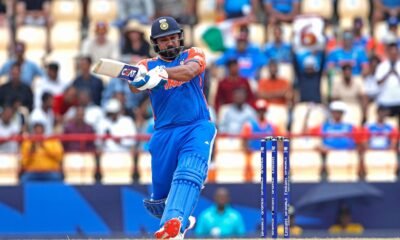Cricket
World Cup: Mohammed Shami and his small band have a ball | Cricket
[ad_1]
It wasn’t the Ben Stokes we’ve known. Although it was the Mohammed Shami we know.

Steaming in for his second over, the eighth of England’s chase of 230 in Lucknow, Shami got the ball to stoke up venom on Stokes. First ball: on a good length seaming away, beaten. Second ball: on that length again, Stokes makes room, swings his bat, mistimes it. Third ball: the length pulled back a touch, Stokes’s bat finally gets it in the middle. Fourth ball: finds the length again, angling it in and nibbling it away from around the wicket only for Stokes to be beaten. Fifth ball: fuller and on the stumps, a flick follows. Sixth ball: Shami keeps it on that good length and asks another question; Stokes answers by making room and going for a wild slog; the ball, skidding and spitting fire, burns into the stumps.
In an ODI World Cup of fastest hundreds, a Maxi-sized miraculous double century and three 400-plus totals, this one over showed the beauty of a bowler in full flow. In a World Cup in India where runs came in fast supply and batters often ran amok, a few bowlers stood up and made us take notice. In a World Cup on Indian pitches where spinners tend to feel at home, four of the five in the top wicket-takers’ chart are fast bowlers — Shami, Dilshan Madushanka, Gerald Coetzee and Jasprit Bumrah.
Shami leads the pack, and quite sensationally at that. Summoned into action only in India’s fifth match to lend balance to the XI after the injury to Hardik Pandya, Shami straightaway showed what they missed. A third frontline pacer who was no less effective than the other two and added value and teeth to the attack. The impact was immediate: 5/54 in his first match against New Zealand, 4/22 against England, 5/18 against Sri Lanka in a surreal night of fast bowling in Mumbai.
Shami made the new ball seam, swing, skid and talk like only he can. Yet it wasn’t all one-dimensional bowling. He was equally efficient with the old ball. Think of that wicket of a set Rachin Ravindra in the 34th over to end a 159-run third-wicket partnership in Dharamsala. Or that strike of Kane Williamson in the 33rd over that broke a 181-run stand and dashed New Zealand’s hopes of victory in the high-pressure knockout match in Mumbai. Accounting for all the top five Kiwi batters, Shami finished the semi-final with dreamy figures of 7/57 and the World Cup with 24 wickets.
Adam Zampa, the lone spinner among the high five who signed off with the most wickets (23) by any spinner in a men’s World Cup, had quite the opposite journey to reach there. By far Australia’s best white-ball spinner over the last couple of years, Zampa took time to get going in India. On a track tailor-made for him in Australia’s first game in Chennai, the leggie went wicket-less against India. Equally ineffective against South Africa (1/70), he came into his own thereafter.
Four-wicket hauls against Sri Lanka (4/47), Pakistan (4/53) and Netherlands (4/8) ensued, and Zampa was back to doing Zampa things. His job in the middle overs assumed greater importance given Australia weren’t picking up wickets with the new ball in this tournament (knockouts aside), and that he was the lone specialist spinner in that attack. Zampa finding his optimal fitness, rhythm and wicket-taking form was a big reason behind the five-time champions getting their campaign back on track after that horror start.
Speaking of horror starts, remember that second-ball dismissal of Rohit Sharma in Mumbai? Expecting it to jag back a touch from the left-armer’s angle, the ball landed on middle stump, went past the outside edge, through Rohit’s defence and took the off stump. That was Madushanka, Sri Lanka’s left-arm pacer who finished with 21 wickets in nine outings. In a campaign where his team had little to write home about, the 23-year-old scripted his own telling tale. A fifer against the hosts, albeit at a cost of 80 runs, was the highlight, and there were also shining spells against Netherlands (4/49), Australia (3/38) and Bangladesh (3/69). To outdo some starry fellow left-arm pacers on show — Mitchell Starc, Shaheen Shah Afridi, Trent Boult — sure takes some doing.
So, does outdoing Kagiso Rabada and Lungi Ngidi in the Proteas pace pack. That’s where Coetzee, the giant, glaring South Africa fast bowler deserves credit. For a player who made his international debut only this year and got into South Africa’s World Cup squad due to a spate of injuries, the 23-year-old enjoyed a breakout tournament. A bit in and out of the XI, he picked up at least one wicket in his eight matches. He’s got the pace and the heart to be a top quick. Look no further than his valiant late burst that took down Steve Smith and Josh Inglis while injecting drama in the semi-final.
There’s seldom drama when it comes to Bumrah. Because Bumrah does best what he knows best — turn up, choke runs, collect wickets. Precisely what he did over the last month and a half, never mind the long injury layoff. He may not have had the headline-spinning spells like Shami, but Bumrah’s 20 wickets were as valuable to India’s march in the home World Cup.
[ad_2]


















